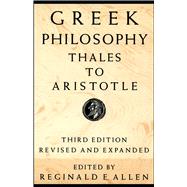
Greek Philosophy
by Allen, Reginald E.Buy New
Rent Textbook
Used Textbook
We're Sorry
Sold Out
eTextbook
We're Sorry
Not Available
How Marketplace Works:
- This item is offered by an independent seller and not shipped from our warehouse
- Item details like edition and cover design may differ from our description; see seller's comments before ordering.
- Sellers much confirm and ship within two business days; otherwise, the order will be cancelled and refunded.
- Marketplace purchases cannot be returned to eCampus.com. Contact the seller directly for inquiries; if no response within two days, contact customer service.
- Additional shipping costs apply to Marketplace purchases. Review shipping costs at checkout.
Summary
Author Biography
Table of Contents
| Preface To The Third Edition | |
| Introduction | |
| Presocratic Philosophy | |
| The Sources | |
| The Milesians | |
| Pythagoras and Pythagoreanism | |
| Heraclitus | |
| The Eleatics | |
| The Pluralists Plato | |
| Euthyphro | |
| Apology | |
| Crito | |
| Meno | |
| The Speech of Socrates in the Symposium(in part) | |
| Phaedo(in part) | |
| Republic(in part) | |
| Phaedrus(in part) | |
| Parmenides(in part) | |
| Timaeus(in part) | |
| Categories(in part) | |
| On the Soul(in part) | |
| Metaphysics(in part) | |
| Nicomachean Ethics(in part) | |
| Politics(in part) | |
| Physics(in part) | |
| Bibliography | |
| Index | |
| Table of Contents provided by Publisher. All Rights Reserved. |
Excerpts
THE SOURCES
No work of the Presocratics has come down in its entirety. We possess fragments preserved by later authors, and testimony. The major sources are as follows:
A. Philosophers
(i) Plato gives useful information about his predecessors. Since he himself was not a historian of philosophy, his remarks must be treated with caution.
(ii) Aristotle surveyed his predecessors' testimony on the philosophical problems with which he himself was concerned. The Presocratics are thus made parties to his argument, not left to speak for themselves, and this often introduces a cast into his interpretation. Nevertheless, he was not without a sense of history, and his work is, and will remain a major source of knowledge.
(iii) The Stoics' method of interpretation was syncretistic: they undertook to show that their predecessors agreed with Stoic doctrine, and with each other.
(iv) Sceptics, such as Sextus Empiricus, were concerned to exhibit the contradictions of earlier philosophy, but preserved valuable fragments.
(v) The Neo-Platonists, especially Proclus, Alexander, and Simplicius, commented on Plato and Aristotle; with the library of the Academy at their disposal, they too preserved many fragments.
B. The Doxographical Tradition
Theophrastus, Aristotle's successor in the Lyceum, continued the Peripatetic interest in history. As part of the encyclopedia of knowledge projected by the school, Theophrastus wroteOn the Opinions of the Physical Philosophers,parts of which have come down to us. He consulted the original texts of the Presocratics, but his historical judgment was much influenced by Aristotle.
Theophrastus' work became the standard authority in the ancient world. The doxographers are those who derive their material, directly or indirectly, from theOpinions (doxai).The main sources in the doxographical tradition are Diogenes Laertius (probably third century A.D.), Plutarch (first-second century A.D.), and John Stobeaus (fifth century A.D.).
Copyright © 1966, 1985, 1991 by Reginald E. Allen
Excerpted from Greek Philosophy: Thales to Aristotle
All rights reserved by the original copyright owners. Excerpts are provided for display purposes only and may not be reproduced, reprinted or distributed without the written permission of the publisher.
An electronic version of this book is available through VitalSource.
This book is viewable on PC, Mac, iPhone, iPad, iPod Touch, and most smartphones.
By purchasing, you will be able to view this book online, as well as download it, for the chosen number of days.
Digital License
You are licensing a digital product for a set duration. Durations are set forth in the product description, with "Lifetime" typically meaning five (5) years of online access and permanent download to a supported device. All licenses are non-transferable.
More details can be found here.
A downloadable version of this book is available through the eCampus Reader or compatible Adobe readers.
Applications are available on iOS, Android, PC, Mac, and Windows Mobile platforms.
Please view the compatibility matrix prior to purchase.
